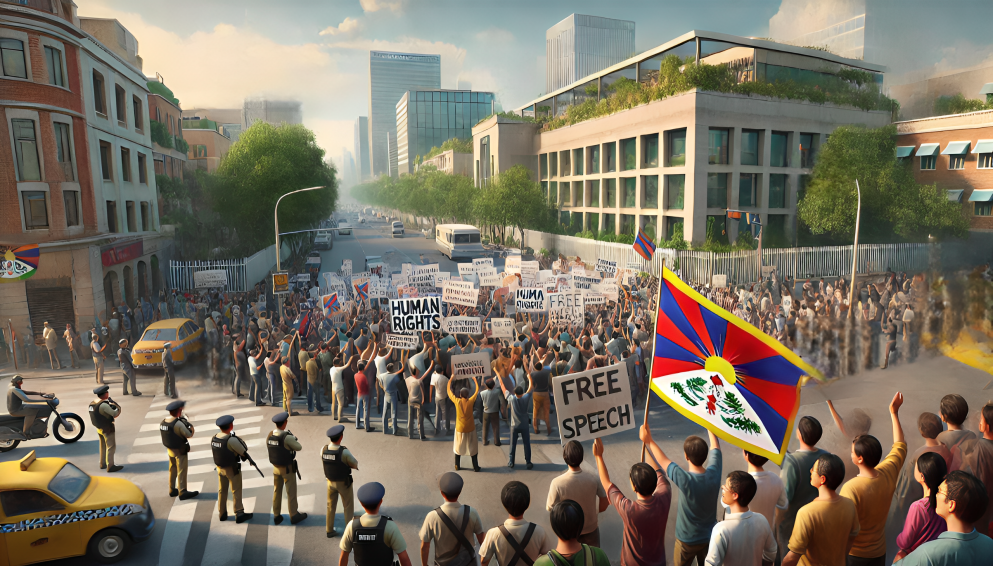Should Immigrants Have The Same Rights To Protest As Citizens


News:
Recently, on March 10, 2025, Tibetan exiles gathered near the Chinese Embassy in New Delhi to mark the 66th anniversary of the 1959 Tibetan uprising against Chinese rule. Protesters waved Tibetan flags, chanted slogans against Beijing, and called for global support, urging India to take a firmer stance on Tibet’s freedom.
Arguments in Favor of Immigrants Having the Same Right to Protest as Citizens
- The Right to Protest is a Fundamental Human Right
Freedom of speech and assembly are enshrined in international human rights law, including the Universal Declaration of Human Rights (Article 19 & 20). Denying immigrants this right contradicts democratic principles.- Example: The United Nations recognizes peaceful protest as an essential mechanism for holding governments accountable, irrespective of nationality.
Immigrants Contribute Economically and Socially
Immigrants pay taxes, contribute to economic growth, and participate in social systems. It is unjust to deny them the ability to voice concerns about policies that directly affect them.
Example: In the U.S., undocumented immigrants contribute billions in state and federal taxes, yet they often have no say in policies that govern their lives.
Restricting Protest Rights Leads to Systemic Exploitation
Without the right to protest, immigrant workers, students, and residents can be subject to exploitation and discrimination without recourse.
- Example: In many Gulf nations, migrant workers face inhumane labor conditions but lack the legal right to protest, allowing employers to exploit them without accountability.
Protest is a Peaceful Mechanism for Policy Reform
If immigrants are denied the right to peaceful protest, it may push grievances underground, leading to civil unrest. Allowing structured protests provides a constructive way for concerns to be addressed.
Example: In the U.S., immigrant-led protests have influenced key policy changes, such as the Deferred Action for Childhood Arrivals (DACA) program.
Democratic Societies Should Not Discriminate in Civil Liberties
A democracy’s legitimacy is based on equal protection under the law, and excluding immigrants from protest rights undermines democratic values.
- Example: Countries like Canada and Germany allow immigrants to protest, reinforcing their commitment to equal rights and democratic participation.
Protesting Encourages Social Integration
Immigrants engaging in protests become more politically aware and integrated into society, fostering civic engagement and reducing alienation.
- Example: Immigrant participation in climate change and labor rights movements has strengthened solidarity between citizens and non-citizens.
Historical Precedents Show the Importance of Immigrant Protests
Throughout history, immigrant-led protests have played a vital role in civil rights advancements.
Example: In the 1960s Civil Rights Movement, many immigrant activists joined forces with African Americans to fight for equal rights, demonstrating that social progress often relies on broad participation.
Arguments Against Immigrants Having the Same Right to Protest as Citizens
Protesting is a Political Right Exclusive to Citizens
Political engagement, including protests, should be reserved for those who hold full legal status and have pledged allegiance to the country.
Example: Many countries, including China and Saudi Arabia, strictly limit political activism to citizens, maintaining that political rights come with national obligations.
- Immigrant Protests Could Undermine National Sovereignty
Allowing non-citizens to protest could result in foreign influence over domestic policies, potentially destabilizing national governance.- Example: In some European nations, protests led by immigrant groups have advocated for foreign political agendas, raising concerns over national sovereignty.
- Security and Public Order Risks
Mass protests involving immigrants could lead to disruptions, clashes with law enforcement, and potential radicalization if not properly regulated.- Example: France has witnessed riots and violent protests involving immigrant communities, prompting discussions on limiting non-citizen protest rights.
- Immigrants Do Not Have Full Civic Responsibilities
Citizens have rights and responsibilities, including voting, military service, and loyalty to the nation. Non-citizens, particularly temporary or undocumented immigrants, do not bear the same obligations and should not have identical political rights.- Example: Countries like Japan and Switzerland do not allow non-citizens to engage in protests, citing the absence of full civic responsibility.
- Protests by Non-Citizens Could Influence Immigration Policies Unfairly
If non-citizens are given full protest rights, they could demand changes in immigration policies that favor their interests over national priorities.- Example: Some critics argue that large-scale immigrant protests in the U.S. pressured policymakers to consider amnesty programs, despite opposition from a segment of the citizen population.
- Alternative Avenues Exist for Immigrants to Voice Concerns
Immigrants can engage through legal channels such as petitions, advocacy groups, and community discussions, rather than street protests.- Example: Many legal advocacy organizations successfully negotiate with governments to improve immigrant rights without resorting to mass demonstrations.
- Governments Have a Duty to Prioritize Citizens First
A government’s primary duty is to its citizens, and allowing non-citizens the same protest rights could dilute citizen voices and influence national policies disproportionately.- Example: Some argue that granting non-citizens full protest rights could shift political priorities, especially in countries with high immigration rates.
Conclusion:
The debate over whether immigrants should have the same protest rights as citizens centers on balancing democratic principles with national sovereignty. While denying protest rights risks suppressing legitimate grievances, unrestricted protest rights could pose security and political challenges. The ideal approach may lie in moderate legal frameworks that permit peaceful demonstrations while maintaining national stability.